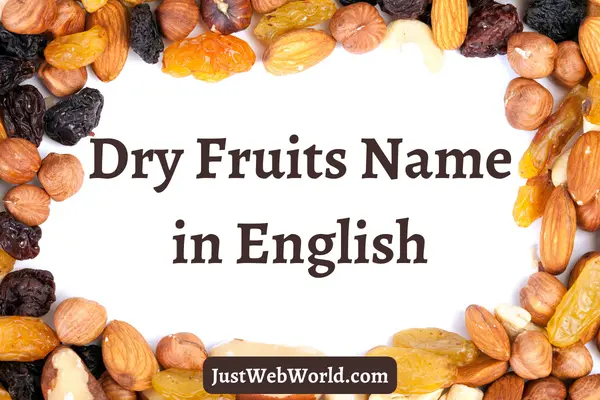Dry fruit is a fruit from which the water content has been removed through evaporation. This process can be achieved through sun drying, air drying, or freeze-drying. Dry fruits are often associated with winter, as they are often used in festive dishes and desserts. Dry fruits are fruits that have been dried, either naturally or through artificial means.
List of Dry Fruits Name in English with Pictures & Description

This process removes the water content from the fruit, leaving behind nutrients, vitamins, and minerals. Dry fruits are a good source of vitamins, minerals, and fiber. They are also a concentrated source of calories, so they should be eaten in moderation. Dry fruits can be a healthy snack for people of all ages. They are easy to store and transport, and they have a long shelf life.
Almond
Almond dry fruits are a type of nut that is popular in many parts of the world. They are known for their sweet taste and their many health benefits. Almonds are a good source of protein, fiber, and vitamins, and they can help to lower cholesterol levels.
Additionally, almonds are thought to be beneficial for weight loss and for preventing heart disease. Almonds can be eaten raw or toasted as a snack or added to sweet or savory dishes. They are also available in sliced, flaked, and slivered forms, as well as flour, oil, butter, and almond milk.
Almonds are commonly referred to as nuts, but they are seeds rather than true nuts. Almond trees were possibly among the first trees that people cultivated. Archaeologists in Jordan discovered evidence of domesticated almond trees dating back 5,000 years.
Cashew Nuts
Cashew nuts are dry fruits that are rich in minerals, vitamins, and antioxidants. They are an excellent source of dietary fiber and protein. Cashew nuts are also a good source of monounsaturated fats, which are known to promote heart health.
These nuts have numerous health benefits and are high in vitamins E and B6. They can also be used to add rich texture and flavor to a variety of dishes.
Pistachio
Pistachios are a type of tree nut that has a variety of health benefits. Protein, antioxidants, and fiber are all abundant in pistachios. Pistachios have been consumed for thousands of years. They are now consumed in a variety of dishes ranging from salads to ice cream.
A serving of pistachios contains approximately 37% of the daily vitamin B6 requirement for adults or 1.3 mg. the dependable source of Vitamin B6 is essential in the body, particularly in protein metabolism and cognitive development.
Raisins
Raisins are dry fruits that are typically made from grapes. The grapes are dried in the sun or in an oven, and then they are often treated with sulfur dioxide, which helps to preserve their color and flavor. It are a good source of antioxidants and they also contain fiber, vitamins, and minerals. Raisins contain 15% water, 79% carbohydrates (including 4% fibre), 3% protein, and no fat (table). It provide 299 kilocalories and moderate amounts (10-19% DV) of several dietary minerals, riboflavin, and vitamin B6 in a 100-gram reference amount.
Walnut
The walnut is a round, smooth-shelled nut that grows on trees in the genus Juglans. The English walnut originated in Persia, and the black walnut is native to North America. Walnuts are a good source of protein, fiber, and essential fatty acids, and they contain vitamins and minerals such as vitamin E, magnesium, and potassium. Walnuts are also a source of antioxidants.
Eating walnuts may help to lower cholesterol and blood pressure and to improve blood sugar control in people with diabetes. Walnuts may also help to prevent cognitive decline and reduce the risk of developing Alzheimer’s disease. The recommended daily intake of walnuts is 1-2 ounces (28-56 grams).
Dried Fig
Dried fruits are fruits that have been dried, either naturally or through an artificial process. This process removes the water content from the fruit, leaving behind a concentrated product that is often higher in sugar and calories than the fresh version.
Dried fruits are a great source of fiber and antioxidants, and they can be a healthy addition to your diet. However, they are also high in sugar and calories, so it’s important to eat them in moderation. When choosing dried fruits, look for ones that are unsweetened and devoid of added sugar.
Date
The date is a sweet fruit that grows on date palms. Date palms are native to the Middle East and North Africa, and the fruit has been a staple food in these regions for centuries. Dates are a good source of dietary fiber and are also a rich source of vitamins and minerals, including potassium, magnesium, and vitamin B6.
Dry dates function similarly to other dry fruits. They have the same amount of vitamins and minerals as regular juicy dates, but because of the lack of moisture, they have even more nutrition packed in a small size. This also extends their shelf life, allowing you to stock up on these in bulk.
Peanuts
Dry fruits are a great source of nutrition and have many health benefits. Peanuts are a type of dry fruit that is high in protein and fiber. They also contain vitamins and minerals that can help boost your health.
High-quality and selective peanuts are used to make peanuts. It is a high-quality product for living a healthy life. Peanuts are an excellent source of plant-based protein, providing 25.8 g per 100 g, or roughly half of a person’s daily protein requirements.
Sesame seeds
Sesame seeds are the edible seeds of the Sesamum plant. They are small, dark brown, or black, and have a nutty flavor. Sesame seeds are used in a variety of cuisines, including Indian, Chinese, Japanese, and Middle Eastern.
They can be used whole, ground into a powder, or pressed into an oil. Sesame seeds are a good source of protein, fiber, and minerals such as calcium, iron, and magnesium. They also contain antioxidants that may help protect against some chronic diseases.
Flax seeds
Flaxseed is a source of both soluble and insoluble fiber, which can help with bowel regularity and digestion. Additionally, flaxseeds contain lignans (PHytoestrogens) – a type of phytonutrient – which can offer some health benefits, like cancer prevention.
Dried fruits are a great source of fiber and antioxidants, which can help promote gut health and prevent chronic diseases. Additionally, dried fruits are a convenient and portable snack option.
Apricot
Dried apricot is a whole apricot that has been dried out by the sun or air. The water inside the fruit evaporates, leaving behind the chewy flesh and the hard seed. Dried apricots are a healthy and delicious snack.
They are a good source of fiber, vitamins, and minerals. Apricots are also a good source of antioxidants. Dried apricots can be stored in a cool, dry place for up to a year. Apricots contain 47% of your daily vitamin A requirements in a single serving and are high in potassium, vitamin E, and copper.
It is critical in protecting cells from free radical damage. This is especially important during the summer when the sun is at its brightest. Dried apricots are beneficial to the skin, eyes, and immune system.
Foxnuts
Foxnuts are a type of dry fruit that is native to the Indian subcontinent. They are typically sold in the form of a dried, roasted, or candied nut. Foxnuts are a good source of protein and fiber, and they contain a variety of vitamins and minerals.
Makhanas, Euryale Ferox, lotus seeds, gorgon nuts, and Phool makhana are all names for fox nuts. Makhana, which is made from popped lotus seeds, has traditionally been eaten as a snack during fasting in India. Makhana is handpicked and packed to ensure that you receive the best product possible.
Pine Nuts
Pine nuts are the edible seeds of certain species of pine trees. They are harvested from the cones of these trees and have a sweet, nutty flavor.
Pine nuts are a good source of vitamins and minerals, including vitamin E, magnesium, potassium, and zinc. They are also a good source of protein and fiber. Eaten alone or in Indian desserts. It’s also used to make traditional Italian pesto.
Water Melon Seeds
Watermelon seeds are dry fruits that are typically oblong and black. They are encased in a hard shell that is white on the inside. Watermelon seeds are a good source of protein and essential fatty acids.
They also contain vitamins and minerals such as iron, magnesium, phosphorus, and potassium. It is commonly used in various sweets and halwa varieties. For example, in motichoor ladoo. In savory dishes, these seeds are ground into a paste with other ingredients to form the curry base.








